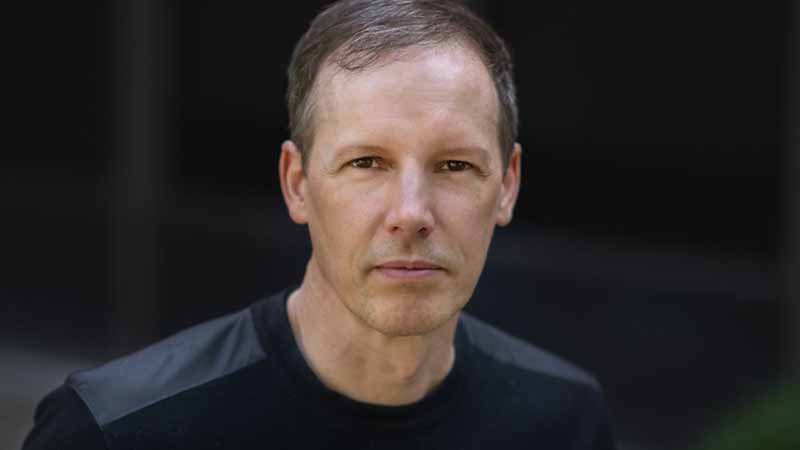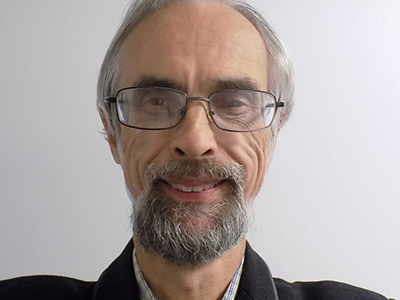Jim McKelvey Co-Founded Square Inc. With a Stack of Hard-to-Copy Innovations
Jim McKelvey co-founded Square Inc., the mobile payments system, because he blew an opportunity to sell an ugly piece of glasswork.

As he recounts in “The Innovation Stack: Building an Unbeatable Business One Crazy Idea at a Time,” he was using his St. Louis, Missouri, glassblowing business in 2008 to fund some projects. Blowing glass is very challenging in large part because of the unstable chemicals. Sometimes the work turns out stunningly beautiful, but one particularly peculiar piece caught the fancy of a woman who came to his studio.
Alas, she wanted to charge it on her American Express card, which many small merchants like him didn't then accept. He did take Visa and Mastercard, but her husband was the Visa cardholder, and she knew he would not share her taste.
"I felt it was really stupid that I could turn my iPhone into everything from a television to a book, but not a credit card machine," McKelvey told Startup Savant.
McKelvey had just spent ten days in San Francisco with Jack Dorsey, who in the 1990s was an employee at Mira, his data imaging storage firm. Dorsey, one of four co-founders of Twitter, had recently been ousted as its CEO because of the turmoil caused by skyrocketing usage (he returned to the helm in 2015 and simultaneously heads Square). They had brainstormed ideas for a project to work on together.
"I realized there was this massive underserved market of small companies that accepted few or no credit cards because of the complicated contracts, expensive equipment, inexplicable charges, poor customer service, and difficulty in even qualifying," he said. "I called Jack and he was also excited by the opportunity, so we decided to dive in, even though we knew nothing about payments."
In 2009, they launched Square (NYSE: SQ), which has since enabled two million more merchants to charge any credit card. It debuted on public markets on November 30, 2015, at a split-adjusted $12 and was recently trading around $221.
Pursuing Crazy Ideas
James Morgan McKelvey Jr.'s mother was "an extroverted and fearless New Yorker" who taught him audacity, which he regards as the most important trait an entrepreneur needs to succeed ("closely followed by stubbornness"). His father was a chemical engineering professor at Washington University in St. Louis (in 2016, the son donated $15 million to construct its new computer science and engineering building named after his dad).
In the fall of 1983, he was a freshman majoring in economics there and bought a $45 textbook written by the chairman of the computer science department. He found it unreadable and discovered that none of the programming examples worked, so he decided to write a better one with the help of friends and the library. When he showed it around, word spread to the nation's top textbook publisher, and at 18, he became a published author and was asked to write another volume.
"Writing my first book was a crazy idea, and since then, I've undertaken a dozen crazy projects," he wrote. "The term entrepreneur has lost its shock value through sheer overuse, but the economist Joseph Schumpeter, who popularized it, described entrepreneurs as revolutionaries and 'wild spirits.' Calling a business owner an entrepreneur is like saying all tourists are explorers. It really means someone who takes great risks to reshape an industry with breakthrough innovations, living on the edge of civilization to do things that haven't been done before."
After graduation, he freelanced for IBM, learned glassblowing (and wrote a handbook on it), built cabinets to hold CDs, and in 1990, started Mira (which now provides software tools and expert services for organizations, such as managing abstracts for conference programs). Dorsey was a junior in high school when he applied for a job and was put on a programming task, not leaving until 5 a.m. the next morning. McKelvey was impressed with his ability to focus and deliver. Dorsey moved to Oakland, California, in 2000 and co-founded Twitter in 2006.
But as soon as they dived into the credit world ocean, McKelvey realized they were way over their heads. If they did manage to invent a way for a smartphone to process a credit card, each transaction would be violating at least 17 laws or industry rules.
"Aside from the regulations, there were dozens of problems we needed to solve at the outset, five of which required solutions that didn't exist," he said.
Squaring up Small Business
The term "squaring up" means settling a debt. Square's mission would be for the more than 5 million small businesses that process less than $100,000 in credit card purchases each year. They are 90% of the total businesses accepting cards but must pay such high fees that they provide 42% of net revenues for the card companies (and their profit margins are 45 times higher on small clients than billion-dollar corporations, McKelvey noted). And then there were the millions of tiny firms that didn't want to wade through reams of contracts or couldn't even qualify.
In their presentation to venture capitalists, McKelvey and Dorsey had a slide that listed "140 Reasons Square Will Fail," which included everything from fraud to a robot uprising. "Most VC pitches are nothing but sunshine and graphs moving up and to the right," McKelvey wrote. "We showed we were thoroughly thinking through all the angles and unafraid to confront potential problems."
Legal issues aside, the challenges were enormous, among them:
- The need to connect their software through a processor that wasn't capable of printing a bill with the name of the merchant who ran the card, so "Square" was all the consumer would see, which would invite lots of disputed charges.
- Negotiations with the major cards that took a year to convince them that Square could bring in millions of new credit-worthy customers.
- The necessity of developing an entirely new way to handle fraud. Card networks consist of issuing banks whose card is used by the buyer and acquiring banks who represent the seller and neither accepts the risk. They vet businesses to be sure they will be able to handle it, which is why many merchants can't qualify. Square wanted to welcome artists and companies which had thin credit histories, while also making it easy for consumers to use its service. Square decided to take on the full risk and found creative ways to detect fraud by comparing suspect transactions to its fast-growing database.
- Normally, the buyer has to swipe a credit card so the card machine can read the magnetic stripe that allows the card to qualify for lower rates. But getting Apple to approve plugging in Square's white card reader to the dock connector would have been a long and expensive process, so they invented a way to use the microphone jack to get an audio read of the stripe.
- Square's square reader was so small that it wobbled 20% of the time on the first swipe until the user got proficient. McKelvey said they didn't change to a larger and more stable size because it looked cool. Users quickly learned how to swipe, then wanted to show how they did it, which created the tremendous attention they needed in the beginning. "You'd be shocked at how hard it is to get people to pay attention to something new — they could see a hovercraft float by and not notice it didn't have wheels."
Ultimately, there were 14 key innovations in the Square system, from making online sign-up super easy to requiring no contracts, which created what he calls an Innovation Stack. Some would be hard to copy and even more so the lock-step process that makes the entire stack successful.
The greatest threat came from Amazon's launch of Register, its own smartphone credit processing system, in October 2014, which challenged Square in four ways. Its hardware was 30% cheaper, it offered a rate of 1.95% vs. Square's 2.75%, its card was easier to use, and it provided live support (which Square was still developing). But a year later, Amazon not only gave up on Register, but it also sent customers a free Square reader. It had been unable to stitch together a full and effective rival Innovation Stack.
McKelvey served as chairman of Square until 2010 and remains on the board.
Find Your Perfect Problem
"If you want to be an entrepreneur and not just a business owner copying what others have done, find a perfect problem for you, something that hasn't been solved, and there are many of them," McKelvey said. Of course, you don't need to read his book about how he went about finding and solving his perfect problem if you have a net worth greater than his $3.9 billion (according to Forbes).
He spends most of his time now working on a wide variety of projects:
- Invisibly is direct response software that allows the user to control pop-ups, rather than using crude ad blockers, to make it easy for consumers to allow messaging that will enable content writers to be paid.
- LaunchCode is a nonprofit that trains programmers for free and helps place them in jobs.
- Third Degree is a glassblowing studio and educational center.
- MADE is a space for other types of artists using everything from textiles to wood to high-tech tools.
- FINTOP is one of the country's top-performing venture capital firms.
In his spare time, he is deputy chair of the St. Louis Federal Reserve Bank, one of the dozen regional institutions that are the foundation of the US economy. "Even though I don't have any serious economic chops, they approached me because they had hired some of the programmers we had trained, who thought I could provide the perspective of a serial entrepreneur," McKelvey said. "I've been super impressed at how through all the chaos of the pandemic, they've been decisive and professional in helping to keep the economy functioning."
About the Author

Scott S. Smith has had over 2,000 articles and interviews published in nearly 200 media, including Los Angeles Magazine, American Airlines’ American Way, and Investor’s Business Daily. His interview subjects have included Bill Gates, Richard Branson, Meg Whitman, Reed Hastings, Howard Schultz, Larry Ellison, Kathy Ireland, and Quincy Jones.
Startup Resources
- Learn more about Startups
- Visit the TRUiC Business Name Generator
- Check out the TRUiC Logo Maker
- Read our Business Formation Services Review
- Find Startup Ideas
- Explore Business Resources
Form Your Startup
Ready to formally establish your startup? Click below to read our review of the best business formation services!
Best Business Formation Services